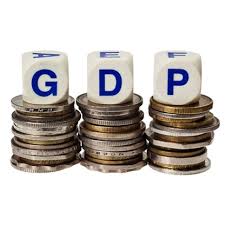Gross Domestic Product, GDP, can be simply defined as the sum of the market value of all the goods and services produced in an economy during a given accounting year. The theory regarding GDP was first introduced by William Petty in an attempt to defend landlords against taxation during the period of 1652 to 1674, a time of war between the Dutch and the English. The concept was further enhanced upon but Charles Davenant in 1695. The GDP of a nation is a measure of the size of its economy. Gross Domestic Product can help us estimate the contribution each sector makes to the national income.
Gross Domestic Product can be measured in three ways, namely, Income Approach, Expenditure Approach and Product Approach.
The Income Approach measures GDP as the sum of:
- Wages
- Interest Income
- Profits
- Rental Income
The Expenditure Approach measures GNP as the sum of:
- Private Consumption Investment
- Investment Expenditure
- Government Consumption Expenditure
- Net Exports
The Product Approach measures GDP as the difference between:
- Value of Output Value of output-value of input
- Value of Input
Gross Domestic Product can be of two types, namely, real GDP and nominal GDP. The real GDP is calculated at base year prices and thus remains unaffected by change in prices. It only depends on the quantity of output. The nominal GDP is calculated at current year prices and thus is affected by both prices and quantity.
Though GDP tells us about the structure of the industries in terms of GDP contribution, it cannot effectively be attributed as a measure of welfare, wealth and prosperity. An increase in GDP may not necessarily mean an increase in welfare and it doesn’t take into account the increase in population. Thus, though GDP may increase, the per capita income falls. Moreover, it doesn’t take into account rise in prices. If the prices increase at a rate greater than GDP then the individual would be worse off, as compared to before. Non-market activities such as leisure activities, activities of a housewife etc that brings pleasure to a family/individual doesn’t count in the GDP, however, increases welfare of the individual.
Click here for government certification in Accounting, Banking & Finance





21 Comments. Leave new
Very well written!
Good work
infomative
Nice article!!
Great!!
Informative
Good Article
Nice work
good efforts
well written
Nicely presented!
Nicely explained.
Well structured Article 🙂 .
Good work 😀
well written
Quite informative!
good one 🙂
Well explained!
very informative, amazing content, commendable job
nicely presented
Basic concept of GDP explained very well! Keep it up!
Well written!